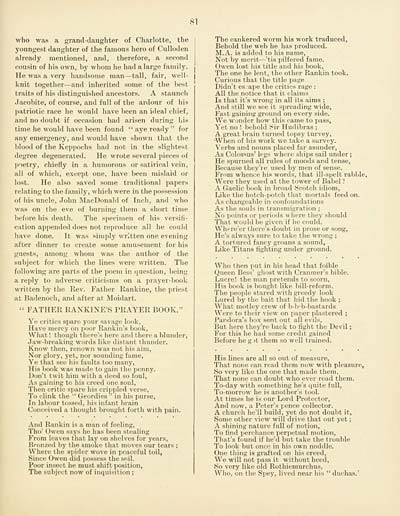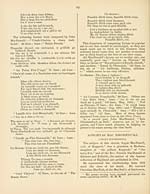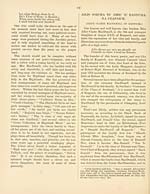Download files
Complete book:
Individual page:
Thumbnail gallery: Grid view | List view

who was a grand-danghter of Charlotte, the
youngest daughter of the famous hero of Culloden
already mentioned, and, therefore, a second
fousin of his own, by wliom he had a large family.
He was a very handsome man — tall, fair, well-
knit together — and inherited some of the best
traits of his distinguished ancestors. A staunch
Jacobite, of course, and full of the ardour of his
jiatriotic race he would have been an ideal chief,
and no doubt if occasion had arisen during his
time he would have been found " aye ready " for
any emergency, and would have shown that the
blood of the Keppochs had not in the slightest
degree degenerated. He wrote several pieces of
poetry, chiefly in a humorous or satirical vein,
all of which, except one, have been mislaid or
lost. He also saved some traditional paper^^
relating to the family, which were in the possession
of his uncle, John MacDonald of Inch, and who
was on the eve of burning them a short time
before his death. The specimen of his versih-
cation appended does not reproduce all he could
have done. It was simply written one evening
after dinner to create some amusement for his
guests, among whom was the author of the
subject for which the lines were written. The
following are parts of the poem in question, being
a reply to adverse criticisms on a prayer-book
written by the Rev. Father Rankine, the priest
at Badenoch, and after at Moidart.
" FATHER RANKINE'S PRAYER BOOK."
Ye critics spare your savage look,
Have mercy on poor Rankin's book,
What ! though there's here and there a blunder.
Jaw-breaking words like distant thunder.
Know then, renown was not his aim.
Nor glory, yet, nor sounding fame.
Ye that see his faults too many.
His book was made to gain the penny.
Don't twit him with a deed so foul.
As gaining to his creed one soul,
Then critic spare his crippled verse.
To clink the •' Geordies " in his purse,
In labour tossed, his infant brain
Conceived a thought brought forth with pain.
And Rankin is a man of feeling,
Tho' Owen says he has been stealing
From leaves that lay on shelves for years.
Bronzed by the smoke that moves our tears ;
Where the spider wove in peaceful toil,
Since Owen did possess the soil.
Poor insect he must shift position,
The subject now of inquisition ;
The cankered worm his work traduced.
Behold the web he has produced.
M.A. is added to his name.
Not by merit — 'tis pilfered fame.
Owen lost his title and his book,
The one he lent, the other Rankin took.
Curious that the title page
Didn't es ape the critics rage :
All the notice that it claims
Is that it's wrong in all its aims ;
And still we see it spreading wide,
Fast gaining ground on every side.
We wonder how this came to pass,
Yet no ! behold !Sir Hudibras ;
A great brain turned to])sy turvey,
•When of his work Vi'e take a survey.
Verbs and nouns placed far asunder,
As Colossus' legs where ships sail under ;
He spurned all rules of moods and tense.
Because they're used by men of sense.
From whence his words, that ill-spelt rabble.
Were they used at the tower of Babel ?
A Gaelic book in broad Scotch idiom.
Like the hotch-potch that mortals feed on.
As changeable in confoundations
As the souls in transmigration ;
No points or ])eriods where they should
That would be given if he could.
Where'er there's doubt in prose or song,
He's always sure to take the wrong ;
A tortured fancy groans a sound,
Like Titans fighting under ground.
Who then put in his head that foible
Queen Bess' ghost with Cranmer's bible.
Lucre! the man pretends to scorn.
His book is bought like bill-reform.
The people stared with greedy look
Lured by the bait that hid the hook ;
What motley crew of b-b-b-bastards
Were to their view on paper plastered ;
Pandora's box sent out all evils,
But here they're back to fight the Devil ;
For this he had some credit gained
Before he g )t them so well trained.
His lines are all so out of measure.
That none can read them now with pleasure,
So very like the one that made them.
That none can doubt who ever read them.
To-day with something he's quite full.
To-morrow he is another's tool.
At times he is our Lord Protector,
And now, a Peter's pence collector.
A church he'll build, yet do not doubt it.
Some other view will drive that out yet ;
A shining nature full of notion.
To find perchance perpetual motion.
That's found if he'd but take the trouble
To look but once in his own noddle.
One thing is grafted on his creed.
We will not pass it without heed.
So very like old Rothiemurchus,
Who, on the Spey, lived near his " duchas.'
youngest daughter of the famous hero of Culloden
already mentioned, and, therefore, a second
fousin of his own, by wliom he had a large family.
He was a very handsome man — tall, fair, well-
knit together — and inherited some of the best
traits of his distinguished ancestors. A staunch
Jacobite, of course, and full of the ardour of his
jiatriotic race he would have been an ideal chief,
and no doubt if occasion had arisen during his
time he would have been found " aye ready " for
any emergency, and would have shown that the
blood of the Keppochs had not in the slightest
degree degenerated. He wrote several pieces of
poetry, chiefly in a humorous or satirical vein,
all of which, except one, have been mislaid or
lost. He also saved some traditional paper^^
relating to the family, which were in the possession
of his uncle, John MacDonald of Inch, and who
was on the eve of burning them a short time
before his death. The specimen of his versih-
cation appended does not reproduce all he could
have done. It was simply written one evening
after dinner to create some amusement for his
guests, among whom was the author of the
subject for which the lines were written. The
following are parts of the poem in question, being
a reply to adverse criticisms on a prayer-book
written by the Rev. Father Rankine, the priest
at Badenoch, and after at Moidart.
" FATHER RANKINE'S PRAYER BOOK."
Ye critics spare your savage look,
Have mercy on poor Rankin's book,
What ! though there's here and there a blunder.
Jaw-breaking words like distant thunder.
Know then, renown was not his aim.
Nor glory, yet, nor sounding fame.
Ye that see his faults too many.
His book was made to gain the penny.
Don't twit him with a deed so foul.
As gaining to his creed one soul,
Then critic spare his crippled verse.
To clink the •' Geordies " in his purse,
In labour tossed, his infant brain
Conceived a thought brought forth with pain.
And Rankin is a man of feeling,
Tho' Owen says he has been stealing
From leaves that lay on shelves for years.
Bronzed by the smoke that moves our tears ;
Where the spider wove in peaceful toil,
Since Owen did possess the soil.
Poor insect he must shift position,
The subject now of inquisition ;
The cankered worm his work traduced.
Behold the web he has produced.
M.A. is added to his name.
Not by merit — 'tis pilfered fame.
Owen lost his title and his book,
The one he lent, the other Rankin took.
Curious that the title page
Didn't es ape the critics rage :
All the notice that it claims
Is that it's wrong in all its aims ;
And still we see it spreading wide,
Fast gaining ground on every side.
We wonder how this came to pass,
Yet no ! behold !Sir Hudibras ;
A great brain turned to])sy turvey,
•When of his work Vi'e take a survey.
Verbs and nouns placed far asunder,
As Colossus' legs where ships sail under ;
He spurned all rules of moods and tense.
Because they're used by men of sense.
From whence his words, that ill-spelt rabble.
Were they used at the tower of Babel ?
A Gaelic book in broad Scotch idiom.
Like the hotch-potch that mortals feed on.
As changeable in confoundations
As the souls in transmigration ;
No points or ])eriods where they should
That would be given if he could.
Where'er there's doubt in prose or song,
He's always sure to take the wrong ;
A tortured fancy groans a sound,
Like Titans fighting under ground.
Who then put in his head that foible
Queen Bess' ghost with Cranmer's bible.
Lucre! the man pretends to scorn.
His book is bought like bill-reform.
The people stared with greedy look
Lured by the bait that hid the hook ;
What motley crew of b-b-b-bastards
Were to their view on paper plastered ;
Pandora's box sent out all evils,
But here they're back to fight the Devil ;
For this he had some credit gained
Before he g )t them so well trained.
His lines are all so out of measure.
That none can read them now with pleasure,
So very like the one that made them.
That none can doubt who ever read them.
To-day with something he's quite full.
To-morrow he is another's tool.
At times he is our Lord Protector,
And now, a Peter's pence collector.
A church he'll build, yet do not doubt it.
Some other view will drive that out yet ;
A shining nature full of notion.
To find perchance perpetual motion.
That's found if he'd but take the trouble
To look but once in his own noddle.
One thing is grafted on his creed.
We will not pass it without heed.
So very like old Rothiemurchus,
Who, on the Spey, lived near his " duchas.'
Set display mode to: Large image | Transcription
Images and transcriptions on this page, including medium image downloads, may be used under the Creative Commons Attribution 4.0 International Licence unless otherwise stated. ![]()
| Early Gaelic Book Collections > Ossian Collection > Macdonald bards from mediaeval times > (91) |
|---|
| Permanent URL | https://digital.nls.uk/80461493 |
|---|
| Description | Selected books from the Ossian Collection of 327 volumes, originally assembled by J. Norman Methven of Perth. Different editions and translations of James MacPherson's epic poem 'Ossian', some with a map of the 'Kingdom of Connor'. Also secondary material relating to Ossianic poetry and the Ossian controversy. |
|---|
| Description | Selected items from five 'Special and Named Printed Collections'. Includes books in Gaelic and other Celtic languages, works about the Gaels, their languages, literature, culture and history. |
|---|

